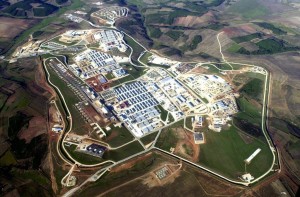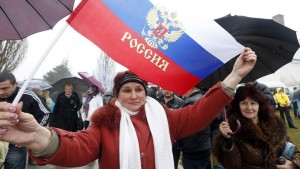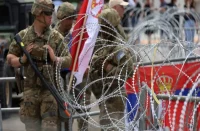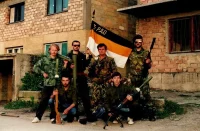Levers Of Influence
Macedonia sits in the current crosshairs of the ‘New Cold War’ between the West and Russia, or more accurately put, between the unipolar and multipolar worlds. Having earlier discussed how the country reached this (un)enviable position and the competing visions that each camp presents it with, it’s now time to explore the strategies that each side can call upon to advance their respective cause:
The West/Unipolarity:
* Albanian Nationalism:
It was previously mentioned how the Albanian population in Macedonia acts as NATO proxies in keeping the country tied to the Western web, and as a ‘fail-safe’ mechanism to prevent the country’s movement towards multipolarity, it could always be redeployed as a militant actor to bring about a return of civil war. This Sword of Damocles hangs over the head of every Macedonian and non-Albanian government figure, and as explained in the author’s previous publication touching upon this threat, is a realistic and probable time bomb that’s only waiting for the external decision to detonate.
Should Albanian nationalism be carried out to these predictable lengths, Macedonia would be destabilized to the point where no energy or infrastructure projects could be realized on its territory. Although this would freeze the West’s own projects (which are more of a ‘unipolar defense’ nature), it would also sabotage Russia and China’s initiatives too, thereby having the consequence of collapsing the ‘mutlipolar offensive’ in the Balkans. In the grand strategic sense, the cost-benefit analysis weights towards the West, wherein it would be to its final advantage to create the Black Hole, despite the collateral damage that this would inflict upon its own interests.
* Camp Bondsteel:
One of the largest US military bases in Europe, this structure sits in the occupied Serbian province of Kosovo and can house 7,000 personnel. Its purpose in the larger context being discussed is to exert pressure on Macedonia and safeguard American designs for the region. By its very existence, it makes the US perhaps the most pivotal military actor in the Balkans, which mustn’t be underestimated in terms of regional calculations. Looking at the abovementioned lever of influence, this means that the US could use the facility to directly aid and/or issue commands to Albanian militia units in Macedonia, which would serve as a force multiplier for any resumption of ethnic insurgency there. It’s not likely that the US will ever pack up and leave Camp Bondsteel on its own prerogative, meaning that its occupying presence in Kosovo and the effect it projects onto the region must be understood as a constant challenge to all multipolar plans for the Southern Balkans.
* Bulgaria’s ‘Cultural Diplomacy’:
Macedonia and Bulgaria have an intertwined history, and because of this, nationalists on both sides of the spectrum refuse to recognize the existence of the other ethnic group. In 2012, the situation deteriorated to the point where Bulgaria joined Greece in blocking Macedonia’s further movement towards the EU. The entire situation between Skopje and Sofia is very complicated and contentious, but the salient point is that Bulgaria can play an integral role in affecting Macedonian affairs. However, it doesn’t only have to be negative, since the two states have surprisingly been moving towards somewhat of a détente in recent months, even agreeing to negotiate a text on “good neighborly relations”. This document would see the two hammering out some of their differences over the Macedonian minority in Bulgaria and the joint commemoration of certain national holidays, which would basically pull Macedonia closer to Bulgaria’s orbit. Thus, it can be argued that Bulgaria is a neighboring state with an imperial longing over Macedonia (owing to history), and it is intent on expressing these ambitions through either hard or soft political means, which could eventually take a form similar to that of Poland’s behavior towards Ukraine or Turkey’s towards Syria.

Altogether, the unipolar world thus applies one direct method of influence (Camp Bondsteel) and two ‘Lead From Behind’ (LFB) proxies in order to exert power over Macedonia. Albania is generally the hard LFB partner, with Bulgaria being the softer counterpart, but together, the ‘good-cop, bad-cop’ dynamo squeezes Macedonia and places it in a strategic vise. Accordingly, because so much pressure is being exerted on the country from the western and eastern flanks, this opens up an outlet for engagement along its northern and southern reaches, which is where Russia and China come in.
Russia/Multipolarity:
* Economic/Energy Enticement:
Altogether, Russia and its Chinese strategic partner really don’t have many tangible tools to use towards influencing Macedonia aside from their prospective future plans, but these visions of the future shouldn’t be discounted in any capacity. The ‘New South Stream’ and the Balkan Silk Road are both powerful projects that can reshape the entire geopolitical balance in Europe if taken to their fruition, but still, they need to contend with the unipolar challenges facing them.
Supporting these projects’ feasibility is the fact that they are logical continuations of Macedonia’s currently existing economic patterns. According to The Observatory of Economic Complexity, around 42% of the country’s exports go to Germany and Serbia through the north, and a total of 27% of imports collectively come from Greece, the UK, and Italy, presumably from the south. No matter whether trade with the UK and Italy is conducted overland through the north or via the seas to the south, a primary fact has been established – a substantial amount of Macedonia’s trade is dependent on the north-south axis connecting the country with Serbia and Greece, not the east-west one linking it with Bulgaria and Albania, proving that the Russian and Chinese plans are efficient overlaps of established trade ties. On top of all of this, Greece has invested nearly 1 billion Euros in the country, which makes it one of the largest overall foreign investors there and underlines how important of a force Macedonia’s southern neighbor is to its economic well-being.
Thus, what makes Russia and China’s projects more valuable to Macedonia than their Western analogues is the fact that they complement existing trade patterns, protect the country’s sovereignty, and increase its geostrategic value. Integrated within Western/unipolar plans, Macedonia is nothing more than a Lego piece that connects the Albanian and Bulgarian coasts, but placed within the Russian/multipolar context, the country’s value as a sovereign actor is respected and elevated, since it acquires an even larger importance vis-à-vis its upstream and downstream partners and is thus empowered in a capacity beyond what the West could ever provide for it.
The Key Difference:
Looked at back-to-back, the Western levers of influence amount to the bullying and intimidation that its stereotypical modus operandi. Through a combination of strong-arm tactics (Albanian nationalism, Camp Bondsteel) and soft power sabotage (Bulgaria), the unipolar world attempts to keep Macedonia in check, and if worst comes to worst, it’ll unleash either a Color Revolution or an ethnic Albanian

insurgency to destroy the country. From the completely opposite angle, Russia and the multipolar world seek to create opportunities and build bridges of influence for Macedonia within their larger framework. In order for their goals to succeed, they understand that the Macedonian government must be reinforced against the previously highlighted Western destabilizing plots. Thus, the primary opposition boils down to destruction versus creation, since the West won’t hesitate to destroy what it cannot use for its own ends (e.g. Syria, Ukraine), but Russia and the multipolar world must build and reinforce what is already existing in order to further their long-term goals. The question thus becomes whether Macedonia is ultimately able to withstand the West’s destabilizing actions in league with Russian and multipolar support, or if it will capitulate and open the door for unipolar domination.
Scenario Forecasting
Having explored all the variables affecting the situation, three distinct scenarios for Macedonia’s future become apparent. Here’s where the country might be headed in the coming years:
The Partition:
A Color Revolution quickly deposes Gruevski, and his pro-Western replacement accelerates the country’s Euro-Atlantic integration and completely surrenders its sovereignty in the process. As a result of the country’s newly crippled position, Albania and Bulgaria see a tantalizing opportunity to project their will upon the state, essentially dividing it between them in the same manner they did over 70 years ago during World War II. Tirana can use the “Balkan Benelux” project to economically institutionalize its dreams of a ‘Greater Albania’, while Bulgaria can continue applying its ‘cultural diplomacy’ mentioned earlier to make inroads even deeper into the state, and not only physically/economically, but also in terms of dismantling its established identity (which would represent the fulfillment of Sofia’s neo-colonial longings). Whether de-facto or de-jure, Macedonia would then become a partitioned state incapable of any independent course of action, and it goes without saying that its overseers would never allow the ‘New South Steam’ or Balkan Silk Road to traverse its territory when it has the pro-Western AMBO pipeline and Corridor 8 instead.
Balkan Breakdown:
In this scenario, Macedonia rebels against the West’s pressure and resists its Color Revolution attempt(s), only to be consequently punished with an externally managed ethnic Albanian insurgency. This transition from Color Revolution to Unconventional War intentionally mimics the model which was applied in Syria, with all of its devastating consequences. The unipolar objective here is to destabilize the Southern Balkans so that it can never be used as a springboard for multipolar influence projection into Europe. Although there obviously will be some resultant blowback to the West, the decision makers responsible for ordering his operation believe that the ‘defensive benefits’ would outweigh the offensive costs. With the state experiencing a complete breakdown of law and order, a Black Hole of Chaos would emerge that could easily suck in Serbia, Russia’s lynchpin of Balkan influence. All the while, Albania and Bulgaria are expected to capitalize off of the situation by pursuing their irredentist designs over Macedonia’s territory, and their possibly overlapping claims could even lead them into unexpected conflict with one another.
The Jugular:
Last but not least, in this vision of the future, the multipolar world has succeed in stabilizing Macedonia’s internal and external situation, and the country serves as the jugular vein for pumping multipolar influence from the shores of the Mediterranean to the gates of Budapest and beyond. At the same time, however, it forever remains vulnerable due to its geography and demographics, thereby meaning that it must continually be protected and reinforced from destabilizing threats. Just as the result of a sliced jugular is a massive bloodbath, so too will lots of blood spill if Macedonia goes the route of the Balkan Breakdown scenario, hence why it’s of critical importance for Russia and China to ‘protect their neck’ in the Southern Balkans. This can be achieved through full-spectrum support (military, economic, political, informational, etc.) for the geo-pivotal state, and if ultimately successful, then the jugular can transform into a spine that provides the multipolar world with the firm backing it needs to entrench itself in Europe.
Concluding Thoughts
Macedonia is literally at the crossroads between the unipolar and multipolar worlds, thus making it among the most prized objects of competition between them anywhere in the world. Russia and China need Macedonia’s geography to open the Balkan gates of Europe to multipolar influence, while the West needs it for the opposite reason, which is to form a unipolar cordon blocking the advance. Both sides have proposed their own energy and infrastructural and they’re mutually incompatible, meaning that only one or the other will eventually win out. Faced with such a situation, Russia must work as closely as ever with China, since the ‘New South Stream’ is impossible without the completion of the Balkan Silk Road. On the other hand, the West’s AMBO pipeline will never see the light of day if the Corridor 8 project isn’t fulfilled.
The resultant drama means that Macedonia is most certainly in for an energized Western-led destabilization campaign to sabotage the multipolar world’s projects, and the recent coup attempt can be seen as the first step towards reaching this goal. Looking at the Syrian and Ukrainian battlefields laid to waste before it in the name of prolonging unipolar hegemony, however, Macedonia will likely have a very tough road ahead of it in the coming years, and Russia and China will surely have their work cut out for them in defending this geo-pivotal state that holds the key to the entire Balkans.














Pingback: The Future Of The Balkans Runs Through Macedonia II… | Protestation
Pingback: The Future Of The Balkans Runs Through Macedonia I | Oriental Review
I know some of these politicians personally, and believe you me, they don’t care about Macedonia/the populace/its culture AT ALL…all they care about is money and staying in power. Admittedly, the left is rabidly pro-USSA and pro-EU, while the ruling VMRO is (well…) more pro-money/power/control…
Point is, they CAN be controlled by the highest bidder (not too sure about the leading “left” party – SDSM – as I think they’ve been pretty compromised by the USSA which obviously has some serious dirt on them to keep them in line), but there are people that KNOW that we belong to the Slavic Orthodox Culture, and MOST OF THEM ARE INTELLECTUALS! Russia could seriously exploit this!
Russia just needs to be more aggressive and assertive, just like the USSA is…these people break under pressure like effin’ cardboard…
C’mon Volodya – enter Macedonia now!
Pingback: Makedonien set fra Makedonien